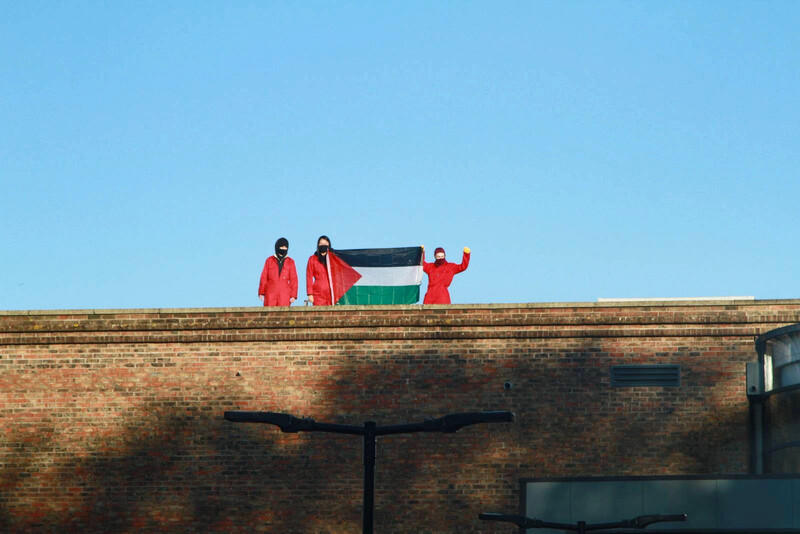The Electronic Intifada 20 October 2022

The 2021 Bristol action took place on the anniversary of the Balfour Declaration.
On 17 October, yet another trial of Palestine Action activists began. The action was scheduled to last three days – as many days as there were people in the dock – yet within hours, the trio were discharged without trial.
It represents yet another victory for the campaign group. On 22 September, another five activists walked free from court before legal proceedings against them even commenced. It had been ruled in advance there was “not enough evidence to provide a realistic prospect of conviction” in their case.
The three newly acquitted activists faced charges of breaching Section 68 of the Criminal Justice and Public Order Act, which stipulates that an offense has been committed if an individual trespasses on land and disrupts someone engaged in lawful activity, or seeks to “deter them … from engaging in that activity.” The maximum penalty that can be applied is three months in jail, or a $2,850 fine.
Given the scale of the trio’s actions, the charges were arguably mild. Back in November 2021, they gained access to major Israeli weapons manufacturer Elbit Systems’ Bristol headquarters, occupied the building and began vandalizing the site to hamper its operation.
Other Palestine Action activists daubed the site with red paint, to signify the Palestinian bloodshed from which Elbit profits, and were met with a rapid response from law enforcement who came equipped with dogs, but they managed to successfully evade arrest.
A flimsy prosecution
The Electronic Intifada has spoken to a Palestine Action activist who attended court and witnessed the trial’s collapse first-hand. It allegedly fell apart because the prosecution failed to prove the action had in any way disrupted the Elbit site’s operation.
The presented evidence against the three was apparently so flimsy, according to the activist, who did not want to be named, that the lead prosecutor is said to have seemed well aware the case didn’t have legs. Appearing “happy go lucky” throughout proceedings, when the presiding judge left the chamber to deliberate on whether to discharge the activists without trial, the prosecutor engaged in amiable “small talk” with defense lawyers, and seemed unfazed when the activists were let go without charge or penalty, the activist told The Electronic Intifada.
The sum of the evidence provided in support of the prosecution case may account for such behavior. Not a single Elbit employee who worked at the headquarters at the time was called to testify, although a photo of a half-full car park was submitted into evidence. The company was nonetheless unable to explain how the activists were responsible for the apparent shortfall of vehicles present, or what the activists actually did.
The only witness put forward by Elbit was the company’s head of security in Britain, Martin Kelly, a former senior detective in the British police’s elite Criminal Investigation Department (CID).
As Kelly wasn’t working for the company at the time, let alone present at the Bristol headquarters when the action occurred, his evidence relied on second-hand accounts from people who allegedly were, although he could not identify them or even specify who had said what.
Kelly’s senior role with Elbit is by-and-large hidden from public view, although a May 2022 article by Palestine Action co-founder Huda Ammori on the The New Arab news site, revealed that months earlier he had infiltrated a WhatsApp chat group used by 180 residents of Shenstone, an English village near the city of Birmingham in the English Midlands, home to an Elbit factory where parts used in the company’s Watchkeeper Drone are manufactured.
Protest actions in the area have alarmed Shenstone’s residents, while also alerting them to the murderous nature of Elbit’s products. As such, the company engaged in a charm offensive to allay criticism and concerns among the local population, delivering printed letters and leaflets to their homes. Kelly penetrating the WhatsApp group was, it seems, part of this attempt to curry favor.
Elbit Systems misleads police
In the group, Kelly sought to deflect damaging charges against Elbit, presenting himself as a “security advisor” for the company who was charged with trying to “resolve some of the issues with Palestine action [sic],” claiming Watchkeeper Drones were “used entirely” by the British Army for “surveillance purposes” and neither had “offensive capabilities” nor were used by the Israeli military nor “any other military force.”
“The company are [sic] concerned about the effect [Palestine Action] is having in the local community and would like any suggestions and are willing to engage with you all in anyway [sic] they can,” he wrote.
Despite such friendly advances, some residents appeared unconvinced, with one asking, “can I ask why you haven’t been to the press with what the company actually do?”
Another deeply suspicious aspect to emerge at the failed trial was that a police investigator revealed Elbit had informed authorities that the Bristol site had no export licenses to Israel. In response, a defense lawyer presented a letter their firm – Kellys Solicitors – had received from the Department of International Trade, confirming that the site was subject to two such “standard individual export licenses (SIELs).”
The Electronic Intifada understands that one license ran from January 2021 to October 2022 and was “extant and exhausted” – in other words valid but used up in terms of what could be exported – while another issued in October 2020 remained fully extant at the time of writing.
Palestine Action charges that Elbit intentionally misled police investigators out of a desire to hide what was happening at the site at the time, and this also accounts for why they were unable and/or unwilling to offer detail on how its activists had disrupted the site’s operation.
A similar story has played out at numerous other trials of the group’s activists, leading them to conclude Elbit representatives are wary of admitting to their active, ongoing and direct complicity in abuses perpetrated against Palestinian civilians in open court.
One of the acquitted activists, who asked not to be named, told The Electronic Intifada that the Bristol action was “particularly important” for the group, as it took place on the anniversary of the 1917 Balfour Declaration, when then-British Foreign Secretary Arthur Balfour declared Palestine to be a national home for Zionists, “without consent or even informing the Palestinian people.”
“Time and time again we have shown that Elbit Systems are corrupt and unlawful,” the activist concludes. “As a British person, I have a responsibility to act. The occupation of Palestine is a direct result of British colonialism and Britain is still complicit, with the supply of weapons and the active support of the British government of Israeli apartheid.”
Kit Klarenberg is an investigative journalist exploring the role of intelligence services in shaping politics and perceptions. Twitter: @KitKlarenberg.





